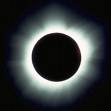Total solar eclipse wraps Asia in darkness, superstition
Millions of people across Asia watched as the longest total  of this century plunged large parts of the continent in darkness Wednesday, but heavy cloud cover disappointed many who had hoped to catch a glimpse.
of this century plunged large parts of the continent in darkness Wednesday, but heavy cloud cover disappointed many who had hoped to catch a glimpse.
Expert and amateur astronomers, scientists, students and tourists fanned out to heritage sites and other spots along the eclipse's path to view and study the celestial phenomenon, during which the moon obscures the Earth's view of the sun as it passes between the perfectly aligned heavenly bodies.
The event was met with excitement from scientists and stargazers while old superstitions that an eclipse was a bad omen continued to spread anxiousness and fears among some.
Monsoonal cloud cover and a constant drizzle played spoilsport in India as the dawn was turned into night for a few brief minutes. Views were obscured in the port town of Surat in the western state of Gujarat, which was the first place from which the total eclipse could be viewed.
The eclipse began there at 5:28 am (2358 GMT Tuesday) and the total eclipse lasted in India from a brief minute to three and a half minutes, depending on where the viewer was on the path of totality, which swept across western, central and eastern India before passing on to China and lengthening to more than six minutes over Japan.
Some of the best views of the total solar eclipse in India were seen from the holy town of Varanasi, where thousands of pilgrims gathered to have a dip in the holy Ganga river.
Those who saw the total eclipse described themselves as overwhelmed, such as experienced space scientist Dr Jayant Murthy, a veteran of several eclipses.
"Totality is a special experience," he said. "The sudden darkness is magical. The diamond ring around the moon's shadow is breathtaking."
In Bangladesh, overcast skies did little to dampen the enthusiasm for those who turned out to watch the morning sky darkening for more than three minutes, starting from 7:56 am (0056 GMT).
"I was lucky to see this celestial wonder because the sky became clear during the full eclipse although initially the sky was clouded," Abdur Rahim said from the northern town of Panchagarh. Billed as the eclipse of a lifetime, people across eastern Nepal, which was in the path of the total eclipse, woke up early only to find heavy clouds and torrential rain.
"It is disappointing because we had prepared so much for the rare event," said Paras Timilsina of Biratnagar, a main viewing spot. "It had not rained here so many days, and it had to happen today."
Despite the cloud cover, Biratnagar was plunged into darkness for about three and a half minutes at the time of the eclipse.
In China, the second large landmass in the totality's path, clouds obscured views in Shanghai and nearby Hangzhou, which the region's experts considered the most likely to give a good view of the eclipse, which lasted almost six minutes there.
On islands in southern Japan, the sound of camera shutters filled their air as enthusiasts watched the phenomenon, which reached their area after 0200 GMT.
Akuseki, an island normally inhabited by 68 people in Japan's far south, was in the international limelight for the six minutes and 25 seconds that the eclipse was visible there, the longest time worldwide, but like on nearby Toshimamura island, solar enthusiasts had to run for cover from a sudden gush of rain without catching much of the eclipse.
Watchers on mainland Japan were also deprived of the celestial phenomenon as heavy clouds covered the sky. Many commuters hurried to their offices in the morning without taking a glimpse of the Tokyo sky, where a partial eclipse could be observed.
Superstitions concerning the eclipse have a firm hold in many parts of the continent. Orthodox Hindus across India stayed indoors until well after the eclipse was over because they see it as an inauspicious time when the sun's energy is masked.
Many do not cook or eat during an eclipse and take a purifying dip in a body of holy water.
According to superstition, an eclipse is also a bad time for childbirth, and expectant mothers are kept indoors. Some make use of modern science to ensure they give birth before the eclipse.
Ancient astronomers in China first recorded solar eclipses 4,000 years ago, where eclipses were once seen as a portent of doom with superstitious Chinese believing they were followed by a major natural disaster or the collapse of an imperial dynasty.
The government issued statements this week to reassure people that there is no link between solar eclipses and earthquakes after calls to local authorities in Sichuan province, which was hit by a devastating quake that killed more than 80,000 people last year.
Few of the tens of thousands of people in Taiwan who watched the partial eclipse visible there said they still believe in superstitions that the eclipse were a "heavenly dog devouring the sun."
Taiwan is hit by hundreds of earthquakes and several typhoons each year, so most residents said they regard a solar eclipse as just another natural phenomenon.
In Nepal, thousands took dips in holy rivers to cleanse themselves from the perceived bad effects of the eclipse as part of the Hindu ritual.
"It felt strange when the morning became night," said Urmila Acharya, a housewife who had defied traditional beliefs that it is bad luck to leave the house during an eclipse. (dpa)